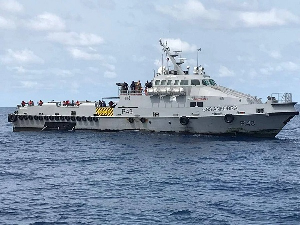The United Nations is supporting Ghana with 90 million dollars and mobilising additional 40 million dollars in the next 18 months to aid Ghana’s recovery from the Coronavirus pandemic, Mr Charles Abani, the UN Resident Coordinator in Ghana, has said.
Mr Abani said the UN would soon roll out its Socioeconomic Response and Recovery Plan to support Ghana's Coronavirus Alleviation and Revitalisation of Enterprises programme, with the focus on developing sustainable Micro and Small Medium Enterprises as a critical part of Ghana’s post COVID-19 recovery strategy.
He said the UN support would focus on five strategic areas - health, social protection and basic social services, economic Recovery, macroeconomic response and multilateral collaboration, and social cohesion and community resilience.
The UN Resident Coordinator said this at the launch of the "For Better Business Together" project, a global partnership to advance the UN's Sustainable Development Goals (SDGs) and strengthen businesses in the wake of COVID-19.
The event was on the theme: “Post COVID-19-Rebuilding Global Business Together".
"The UN will deploy innovative tools for efficient prioritisation of infrastructure projects and to develop a pipeline of bankable projects to be presented at the global SDG investment fair."
Mr Abani said the UN would also build SDG Investor Maps to link private sector to viable investment opportunities and attract investments in the sanitation and waste management sector.
Research shows that developing countries need an estimated investment of US$2.5 to US$3 trillion annually in addition to existing resources to achieve the 17 SDGs to close the financing gap.
Mr Abani said the World’s Gross Domestic Product was estimated at over US$85 trillion dollars and global gross financial assets at over US$200 trillion, according to the World Bank.
However, the International Monetary Fund projected Ghana’s Gross Domestic Product growth to decline from 6.8 per cent to 1.5 per cent, equivalent to loss of US$3.5 billion.
According to the recent survey by the Ghana Statistical Services supported by the UN and World Bank, an estimated 35.7 per cent of business establishments had to close during the partial lockdown, leading to 41,952 job losses.
The State also recorded significant revenue shortfalls from declining exports and imports, low oil revenues, and with non-negotiable health expenditure increases.
Based on the statistics, Mr Abani said Ghana needed approximately US$4.4 billion to close post COVID-19 financing gap and to finance its economic response and recovery programme.
Ms Silke Hollander, the UNDP Deputy Representative to Ghana, commended Ghana’s bottom-up approach in fostering integrated financing to improve local economies through initiatives such as the one district one factory, one village one dam, and planting for food and jobs.
She said that Ghana was one of the four countries and the only African country selected to benefit from the UN transformative initiative of the COVID-19 Private Sector Facility, launched during this year's UN General Assembly.
Ms Hollander said the facility would provide support to SMEs, including women-owned businesses through digitisation and trade facilitation.
“We remain committed to the efforts to supporting businesses to recover better from the impacts of the pandemic and with the sight on the future,” she said.
Mr Ibrahim Mohammed Awal, the Minister of Business Development, said the country's high democratic credentials, political stability, visionary leadership and vibrant entrepreneurial and start-up ecosystem made her the choice for the global launch of the programme.
Regional News of Wednesday, 7 October 2020
Source: GNA













